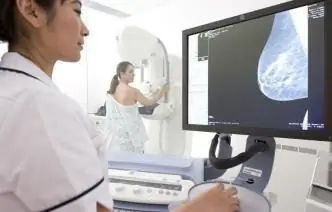Myoclonus

Myoclonus is a convulsive repetitive twitching of large muscle groups. The condition can be observed normally when falling asleep, severe fright. If the cause of the disease is damage to the cerebral cortex, then it is customary to talk about cortical myoclonus (myoclonus). This disease is a type of hyperkinesis. Cortical myoclonus is characterized by a particularly rapid seizure. Patients describe the sudden contraction of a muscle as "electric shock." A number of pathological causes contribute to the development of myoclonus. Acquired myoclonic seizures can occur at any age. In adults, they often occur along with metabolic disorders. For example, myoclonus is recorded with uremia, ketoacidosis, hyperosmolar coma, lactic acidosis, hypoxia. In these conditions, the cerebral cortex is damaged by toxic concentrations of metabolic products (nitrogenous bases, ketone bodies). In newborns, myoclonic seizures are quite common and are associated with neurodegenerative diseases (Alpers disease, Tay-Sachs disease). Myoclonus can occur as a variant of primary generalized epilepsy and become a manifestation of juvenile myoclonic epilepsy or absences with a myoclonic component. Also, twitching of large muscle groups is possible with the progression of various neurological diseases. Most often, cortical myoclonus is observed with diffuse brain damage, especially when gray matter is involved in the process. Such lesions of the cerebral cortex occur in storage diseases (hemochromatosis, amyloidosis,leukodystrophy and others) and infectious processes (Kozhevnikovskaya epilepsy against the background of a progressive form of tick-borne encephalitis and others).
Differential diagnosis of myoclonus
Differential diagnosis of cortical myoclonus is necessary with tremors, tics, tetany, and focal motor seizures.
Symptoms of the disease

Symptoms of myoclonus include short, involuntary muscle contractions that suddenly occur in various parts of the body. According to the degree of involvement of different muscle groups in the process, myoclonus is generalized, regional and local. Localized myoclonus often manifests itself in rapid contractions of the muscles of the face, tongue, and soft palate. Speech (articulation) disorders may occur. Generalized seizures involve several muscle groups at once. With metabolic disorders (uremia, hypoxia), most of the muscles are involved in the process. Most often, involuntary contractions occur in the muscles of the trunk, thigh, shoulder, face. Sometimes the spasm takes over the diaphragm. Like all hyperkinesis, myoclonus increases with emotional experiences. In a dream, symptoms are most often absent.
Diagnosis of myoclonus
Diagnosis of myoclonus is based on the doctor's observation of short-term muscle twitching or the description of such by the patient. To clarify the diagnosis, electroencephalography is performed. To identify the cause of seizures, it is necessary to do a blood test - to determine the level of creatinine and blood urea, blood sugar and some other indicators. Also shown are imaging techniques - X-ray of the skull, computed or magnetic resonance imaging of the brain. The examination for this disease should be carried out by a neurologist. In some cases, hospitalization in a neurological hospital may be required to clarify the diagnosis.
Myoclonus treatment
Treatment for myoclonus depends on the cause of the disease. If myoclonus is associated with metabolic disorders, then the correction of the primary disease leads to a clear improvement in the neurological picture. So, with uremia (increased levels of creatinine and blood urea), active treatment of renal failure is indicated, including peritoneal dialysis, hemodialysis, kidney transplantation. For primary generalized epilepsy with myoclonic seizures, sodium valproate is the most effective drug. Various anticonvulsants - topiramate, lamotrigine, zonisamide and levetiracetam - have a therapeutic effect in all forms of the disease. Benzodiazepines can be used for a quick effect.
Disease prognosis
The prognosis of the disease depends on the etiology of myoclonus. The most unfavorable prognosis in myoclonus is associated with a generalized neurodegenerative disease.
YouTube video related to the article:
The information is generalized and provided for informational purposes only. At the first sign of illness, see your doctor. Self-medication is hazardous to health!







